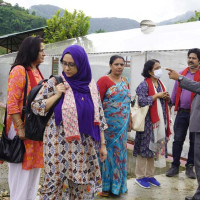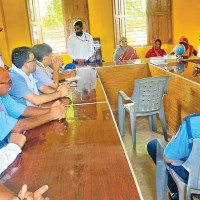- Saturday, 9 August 2025
Escalation In Middle East Demands Mediation
The Middle East is on the cusp of an irreversible geopolitical fray that is moving to an unthinkable spiral. The nations of this region have learned to live with protracted geopolitical tension, wars, deterrence and cold peace. Israel’s series of massive pre-emptive air strikes on June 13, 2015, named Operation Rising Lion on Iran’s military, missile, nuclear sites, energy and electricity and killing of its generals and six nuclear scientists have made the region highly combustible. Israeli Prime Minister Benjamin Netanyahu said that Israel would destroy all nuclear installations of Iran so that no threat emanates from it. “After Iran, we are coming to Pakistan as both are militant regimes with nuclear weapons,” he claimed.
This came in response to Pakistan’s solidarity with Iran. Israel’s attacks have provoked a strong response from Tehran’s Operation Truth Promise, which has unleashed a wave of drone and missile strikes in Israel’s strategic sites -- major cities, scientific institutes, infrastructure and defence installations. Iran had shown its interest in resuming the sixth round of nuclear talks with the US in Oman. But Israel's pre-emptive attack has escalated the conflict in the Middle East, critically injuring Iranian nuclear negotiator Al Shamkhani and subverting negotiations. Israel exerted pressure on the US to insert in its war and cripple Iran’s nuclear ambition.
Violation of the UN Charter
On June 22 President Donald Trump revealed that the Operation Midnight Hammer conducted by the US forces crippled Iranian nuclear facilities at Fordow, Natanz and Isfaha. He warned against retaliation, saying, “Remember, there are more targets left.” Media reveal that American strikes only hit the surface of entry and exit points, while real uranium sites go undetected. The Iranian government stated, "The United States, a permanent member of the United Nations Security Council, has committed a grave violation of the UN Charter, international law and the NPT by attacking Iran's peaceful nuclear installations. The events are outrageous and will have everlasting consequences.
Every member of the UN must have been alarmed over this extremely dangerous, lawless and criminal behaviour. In accordance with the UN Charter and its provisions allowing a legitimate response in self-defence, Iran reserves all options to defend its sovereignty, interests, and people." The US has increased its military support to Israel, deployed military aircraft and thousands of troops in its bases in Qatar, Iraq and Bahrain. The former two became Iran’s missile targets. Iran is a member of the NPT and is obliged to eschew nuclear weapons. It has a safeguard agreement with the International Atomic Energy Agency that verifies its nuclear status. Director-General of IAEA Rafael Grossi said, “There is no evidence of Iran building nuclear weapons.”
The US attack on Iran has escalated the conflict and engulfed many nations in the Middle East. Turkey is strengthening its deterrence capability and believes that if it does not support Iran, no nation will support it in times of crisis. Jordan, which is protecting Israel, stopping Iranian drones from flying over its sky to attack Israel and preventing Yemeni forces from imposing a naval blockade, remarked, “Israeli offensive expansion to Iran threatens global stability.” The Israel-US-Iran war has polarised world politics as both sides are backed by their allies. Iran is supported by Russia, China, North Korea, Pakistan, Turkey and Afghanistan and a network of non-state armed actors — Iraqi militia, Hamas, Houthis and Hezbollah acting against Israel and the USA. They would not allow the collapse of Iran or regime change.
The first four nations have nuclear weapons, while Turkey has signed the NPT. Still, Turkey’s Prime Minister Recep Tayyip Erdogan, supporting Iran, said, “It has a legitimate right to defend itself against Israel’s state terrorism.” Russia has provided an air defence system and 200 scientists to Iran, while China’s purchase of its oil boosts its economic viability and strategic partnership. Iran, as a part of the new global order, is seeking military support from Russia, China and North Korea. It said that it cannot fight alone against Israel with the superior military technology of the US.
The US is helping Israel to shut down Iranian missiles and drones, continues to back up its defence build-up and threatens Iranian leaders to unconditionally surrender or face action. Iran reacted that it would not surrender but fight with America, causing “irreparable damage” to its military bases in the Middle East with 45,000 military personnel. The US government has offered to broker a negotiation but Iran responded with “nothing to say to crime partners.” The US wants to avoid possible Iranian attacks on its citizens and bases. Russia strongly warned the US against aiding Israel militarily, saying it could trigger full-scale regional destabilisation. China has called for a ceasefire and de-escalation of conflict and criticised Israel for violating international law and infringing Iranian sovereignty and territorial integrity.
It has shown interest in the mitigation of conflict. Iran is a member of the Shanghai Cooperation Organisation (SCO) and BRICS and can mobilise nations from the Global South to air moral voices for justice. India and China have a great stake in the stability of Iran. India has invested in developing Chabahr port as it provides access to India to trade routes of Central Asia but also a defence partner of Israel. The Iran-China rail corridor is significant for the smooth supply of oil to China and boosts its geopolitical influence in West Asia. China purchases 90 per cent of Iranian oil, while non-oil trade is $34.1 billion.
The Strait of Hormuz, situated between Iran and Oman, is a strategic sea route for Gulf countries, India, China, Japan and South Korea. About 50 per cent of India’s crude oil imports and 60 per cent of its natural gas imports pass through this. About 20 per cent of global oil and gas flows from this corridor. Left with no choice, Iran can shut down the Strait of Hormuz to block the flow of oil and trade. Fear of the erosion of its naval dominance, the US has urged China to deter Iran from shutting down trade routes.
UN Secretary-General Antonio Guterres stressed the need for diplomacy to end the Israel-Iran war. China has supported the role of the UN Security Council and, along with Russia, backed its emergency meeting calling for a ceasefire. French President Emmanuel Macron warned against the US and other powers “pushing for regime change in Iran, indicating it could destabilise the greater Middle East.” On June 20, Iranian Foreign Minister and his European counterparts from France, Germany and the UK met in Geneva to find a diplomatic solution to the Iran-Israel conflict but Iran stated that aggressors must be made accountable. These nations had played a significant role in the 2015 negotiations over Iran's nuclear deal and cooperation with the UN nuclear watchdog.
Twenty-two nations led by France, the UK, Australia, Germany and Canada issued a statement criticising Israeli Prime Minister Benjamin Netanyahu for attacking Iran and imposing a blockade in Gaza, preventing humanitarian supplies and creating famine. France, Canada and the UK threatened concrete action against Israel, including sanctions, for its activities in Gaza and the West Bank. They, however, supported Israel’s right to defend itself from terrorism but called its actions unpalatable. The UN has also demanded that Israel enable the UN humanitarian organisations to work independently and impartially to save lives. China has earlier air-dropped food and essential goods. Twenty Middle Eastern nations have, in a joint statement, called on both sides to maintain restraint and return to diplomacy.
The success in the negotiation of the Israel-Iran conflict this time can neutralise the US's escalating interest in using the British base in Diego Garcia and the Indian Ocean. In order to de-escalate war through ceasefire, many nations have shown interest in mediation. Among them are Qatar, Oman, Saudi Arabia, United Arab Emirates and Egypt. They are engaged in making sincere efforts for mediation. Other global powers such as the US, Russia, the European Union and China have also demonstrated efforts to de-escalate tensions and find scope for peace in the Middle East. Iranian authorities are positive about these initiatives but prefer that Israel stop their attacks first. Before Israeli attacks, the US evacuated many of its embassy personnel, including in Bahrain, to save itself from potential Iranian retaliation, moved fighter planes in the region and signed a military order to start a war with Iran despite popular resistance.
Russian President Vladimir Putin says that his nation could help broker a deal between Israel and Iran. It has leverage on both sides, played a delicate balancing role between the two in the past and navigated practical ties. To him, a negotiated settlement can help Iran follow a peaceful atomic programme while mollifying Israel’s security concerns. Russia has signed a strategic partnership treaty with Iran. In his talk with Putin, Trump suggested focusing on settling the Ukraine conflict but also said that he is open to President Putin’s offer to mediate the conflict in the Middle East. Russia’s relations with Israel have soured following the war in Ukraine and its support to Palestine.
Balancing act
Recently, Ukrainian President Volodymyr Zelanskyy sought more pressure from the US and the EU on Russia after the deadly strike weakened the terms of the ceasefire and the prospective peace deal. He expressed his indignation over the Israeli Prime Minister’s request to the US President to shift its air defence system from Ukraine to Israel. This puts the US in a strategic dilemma, which is advocating peace through strength. Many nations of the Global South prefer a balancing act rather than countering either China or the USA and managing risks to their security, economy and polity. The governments of the EU have agreed to set up a fund to invest in defence industries to respond to Russian security threats and US protectionism.
In this context, the EU is engaging more with the nations of the Global South and articulating its own justice, peace and welfare measures based on human rights, democracy and the rule of law. The security and prosperity of Europe rest not only on its self-defence but also on inclusive partnership and the sustainability of development globally. Its approach to diplomacy to resolve the Israel-Iran conflict, recognising the homeland for Palestinians and Israelis' right to exist, makes strategic sense to bring peace and revitalise the UN, multilateral institutions and the architecture of global governance.
(Former Reader at the Department of Political Science, TU, Dahal writes on political and social issues.)



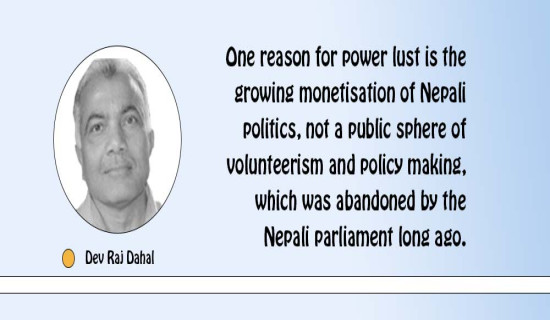
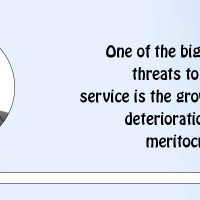
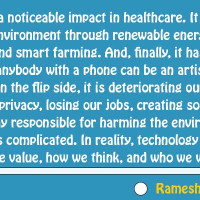
-original-thumb.jpg)
